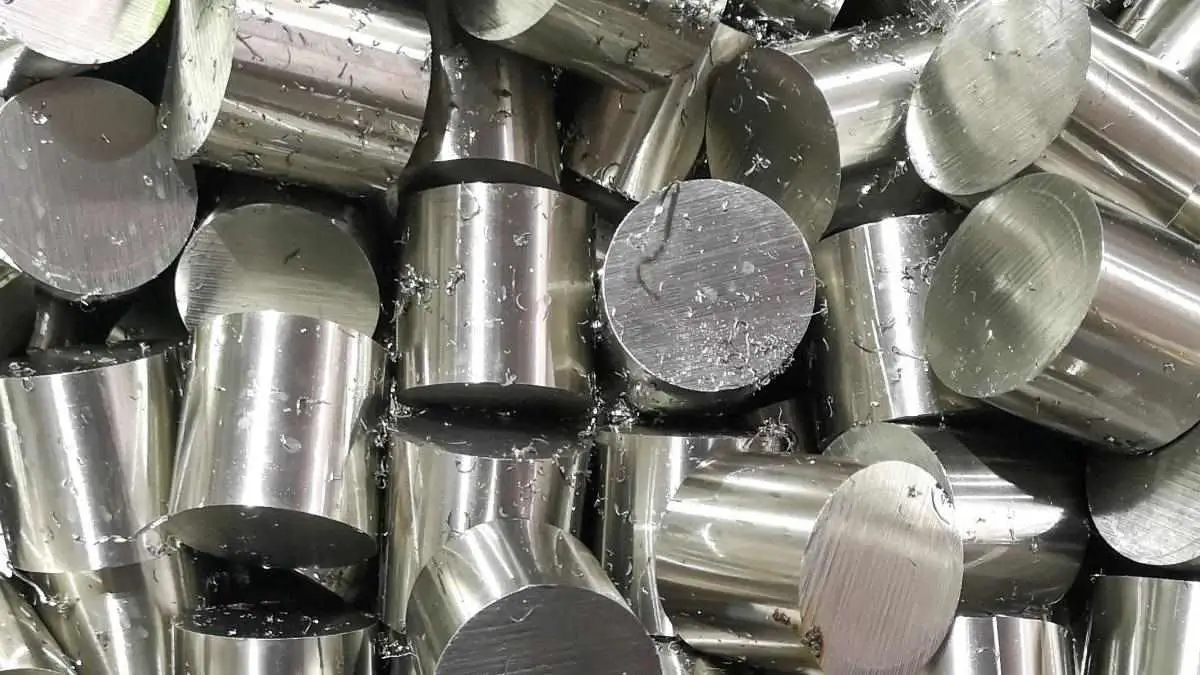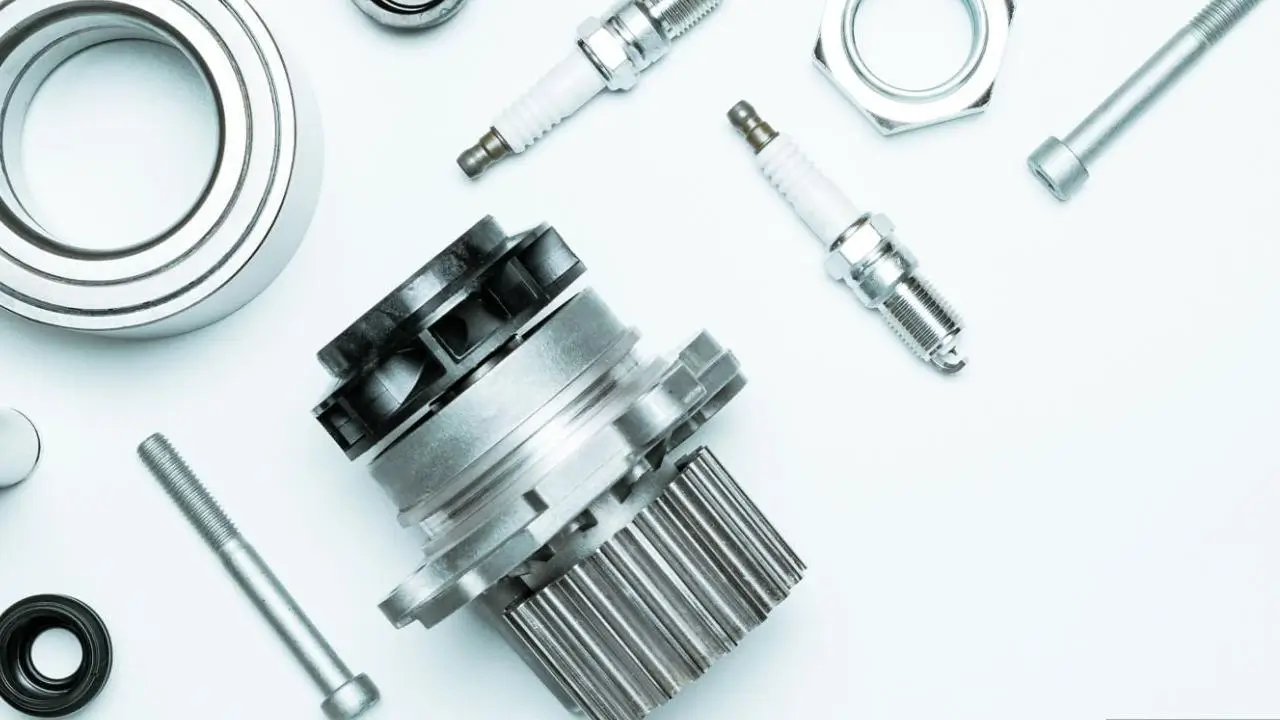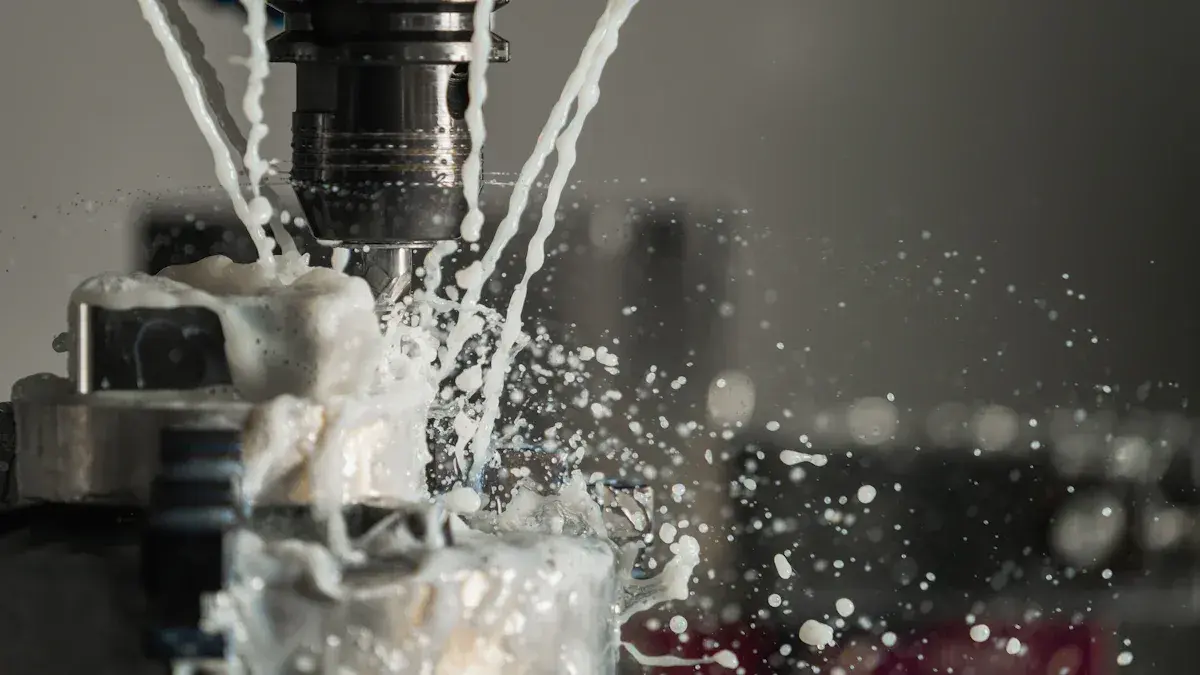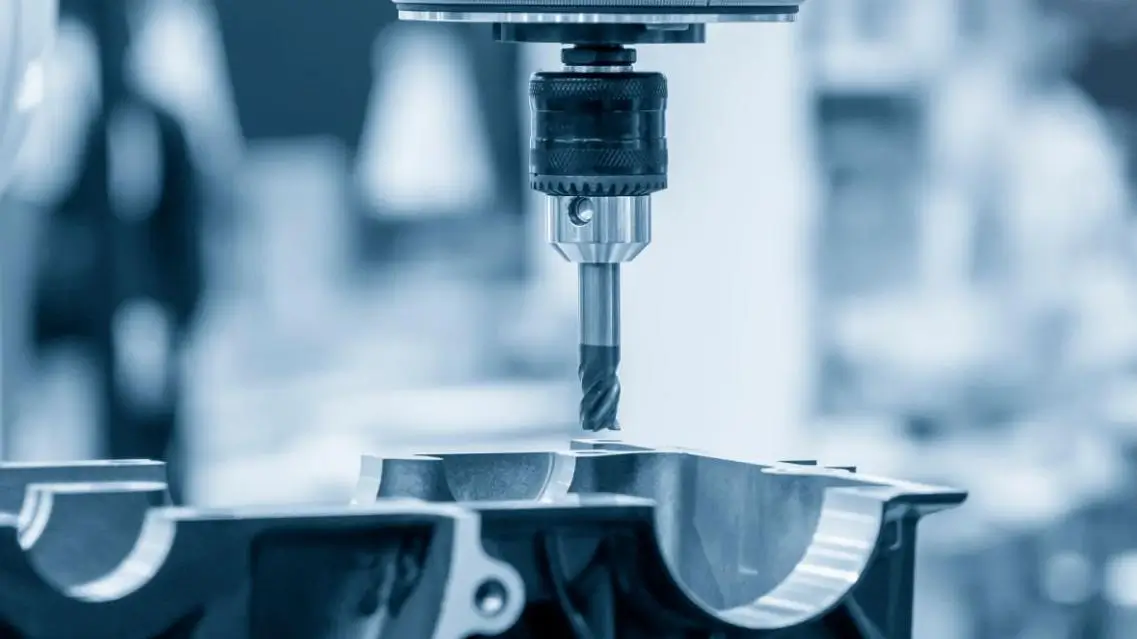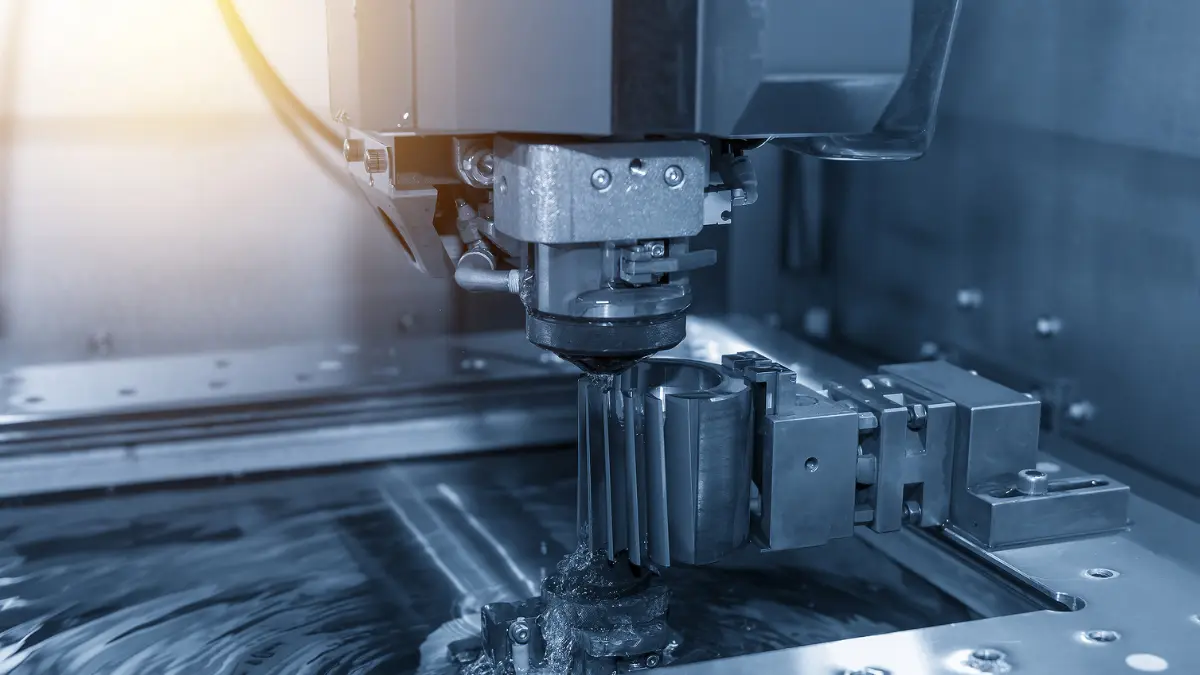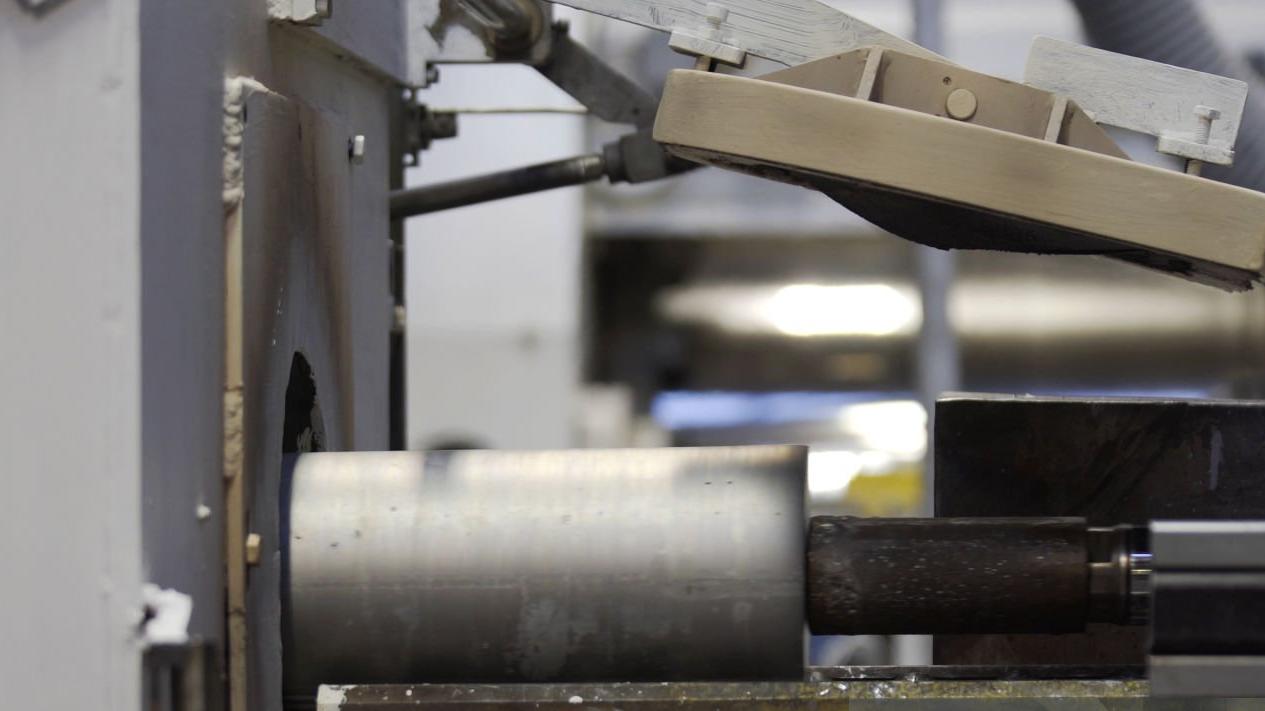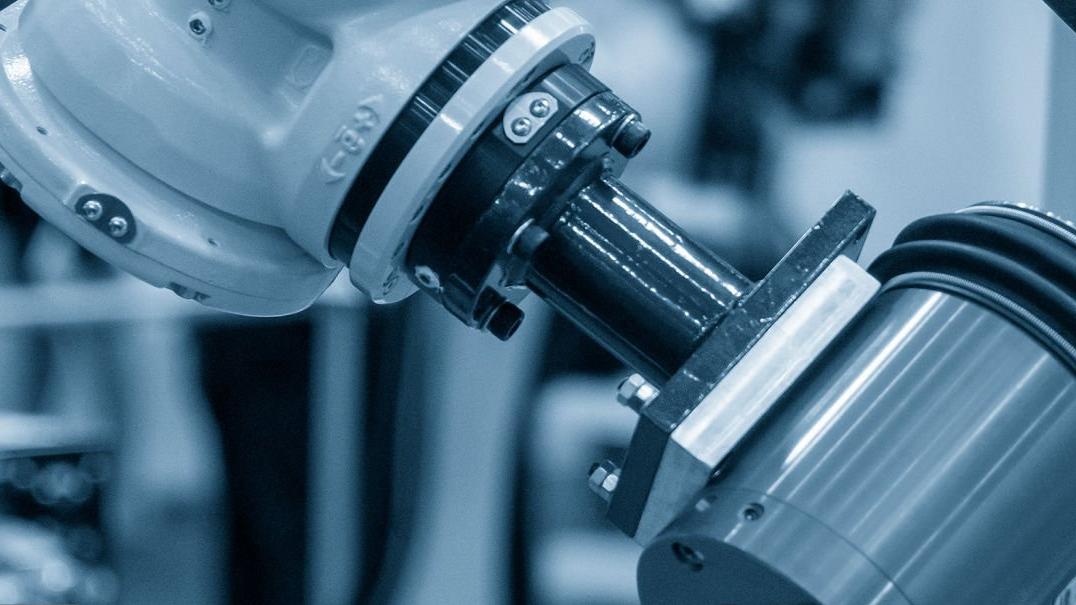In high-end manufacturing, the choice of CNC machining materials is not only a balance between cost and performance, but also a key factor affecting product quality, lifecycle and customer satisfaction. As aerospace, biomedical, new energy and other industries demand higher levels of component performance, materials technology is evolving rapidly.
So how can engineers and purchasers in 2025 accurately select CNC machining materials, improve processing efficiency and maximise design value?
In this guide, we will analyze seven advanced CNC machining materials. These include titanium alloy, carbon fiber, and PEEK etc., We will look at their performance, machining challenges, and common uses. This information will help you make better decisions for high-performance manufacturing.
CNC Machining Materials Overview:
1. Titanium Alloys (Representative Type: Ti-6Al-4V)
Titanium alloys, like Ti-6Al-4V (Grade 5), are strong and lightweight. They resist corrosion well and are safe for the body.
These alloys are important for aerospace and medical devices. Its strong mechanical properties stay stable at high temperatures. This makes it suitable for tough working conditions with heavy loads and severe corrosion.
- Strengths:High specific strength, low coefficient of thermal expansion, seawater corrosion resistance, suitable for implant grade parts.
- Challenges:include poor thermal conductivity and heat buildup in the machining area. This leads to severe tool wear. Additionally, coolant control and special tool coatings are necessary.
2. Aluminium alloys (Aluminium alloys common type: 6061-T6 / 7075-T6)
Aluminium alloy is one of the most widely used metal materials in CNC machining. It is easy to machine. It conducts heat and electricity well. It is also lightweight.
Because of these qualities, many industries use it. These include electronics, automotive, aerospace, and medical fields.
- Advantages:Suitable for high speed machining, good surface quality, suitable for anodising, high precision and mass production.
- Challenges:Some high-strength aluminium alloys (such as 7075) may have poor weldability, pay attention to deformation control and heat-affected zone management during processing.
3. Stainless steel (Stainless steel representative models: 304 / 316L / 17-4PH)
CNC often uses austenitic stainless steel like 304 and 316L. It also uses martensitic stainless steel like 17-4PH. These CNC machining materials are common in medical devices, food equipment, structural parts, and other areas. Stainless steel has high strength, excellent corrosion resistance and stable chemical properties.
- Advantages: The finished products are very durable. They resist corrosion and work well in tough environments. They are also good for surface mirror polishing.
- Challenges:apparent work hardening, high cutting force, short tool life. You need to control cutting speed, feed, and cooling strategy appropriately to reduce machining difficulties.
4. Carbon Fibre Composite CNC Machining Materials
Carbon fiber materials have high strength and stiffness. They also have great fatigue properties. This makes them ideal for high-end structural parts. They are especially popular in aerospace, racing cars, and robot frames.
- Advantages: Light weight, high stiffness, excellent corrosion resistance, suitable for lightweight construction.
- Challenges: Strong anisotropy, prone to delamination and burrs during machining, diamond tools, dry cutting process and low speed precision milling strategies are required to ensure edge integrity.
5. Inconel 718 (high temperature alloy)
Inconel 718 is a nickel-based alloy that can handle high temperatures. Engineers use it in tough environments like aero engines, gas turbines, and the nuclear industry.
- Benefits:Excellent high temperature strength and creep resistance, suitable for use in long cycles with high thermal loads.
- Challenges:Drastic work hardening, poor thermal conductivity, high cutting temperature. To control machining efficiency and surface quality, use low feed and high depth of cut strategies. We also need rigid fixtures and heat-resistant coated tools.
6. PEEK Engineering Plastic (Polyether Ether Ketone)
PEEK is a semi-crystalline high performance thermoplastic with high temperature resistance (>250°C), chemical resistance, abrasion resistance and excellent mechanical properties.Researchers widely use it in medical implants, electronic semiconductor devices, and aerospace insulation.
- Strengths:High thermal stability, good dimensional stability, can withstand multiple sterilisation methods.
- Challenges:Machining requires controlled heat build-up to avoid surface melting.I recommend using precision ground tools, low speed, and high feed strategies with dry or micro-lubrication systems.
7. Silicon Nitride Ceramics (SNC)
Silicon Nitride Ceramics is a strong and tough material. It can resist thermal shock and has good insulating properties. This makes it suitable for high-load precision uses. Examples include high-speed bearings, aerospace nozzles, and medical knives.
- Benefits:extremely high hardness, excellent resistance to corrosion and high temperature oxidation, strong electrical insulation.
- Challenges:Machinists mainly perform precision machining using grinding, ultrasonic, or laser methods. These methods are costly and are best for high value-added products.
Machining solutions for CNC machining materials
Each material has unique machining parameters. Below are typical machining parameters, required machining conditions and challenges for CNC machining materials:
|
Materials |
Typical Spindle Speed |
Feed rate |
Cooling Requirements |
Processing challenges |
| titanium | 60–120 m/min |
Medium |
High |
Tool wear, heat generation |
| PEEK | 150–300 m/min |
High |
Low |
Burrs, poor rigidity |
| Inconel | 20–60 m/min |
Slow |
High |
Workpiece hardening, high cutting force |
| aluminum | 200–400 m/min |
fast |
Low |
Higher cutting temperatures require proper control |
| stainless steels | 80–150 m/min |
Medium |
Medium |
Requires high cutting forces and high surface finishes |
| Carbon Fiber Composites | 100–250 m/min |
High |
None |
special tools required |
| Silicon Nitride Ceramics | 100–150 m/min |
Slow |
High |
High tool wear, high brittleness, difficult to cut |
Each of these materials presents different machining challenges. We improve the machining process for each material. We use the right technologies and methods to ensure precision and efficiency. Some materials have high tool wear, high brittleness, and are difficult to cut.
CNC Machining Materials: Industry Applications at a Glance
To help you choose materials for your needs, we offer a quick reference table. This table shows materials and their common uses in different industries.
| Materials | Typical application parts | Applicable industries | Core Advantages |
| titanium(Ti6Al4V) | Orthopedic implants, aircraft structural components, engine blades, drone mounts | Aerospace, medical, military, new energy | High strength and light weight, corrosion resistant, biocompatible |
| aluminum(6061/7075) | Battery Housing, Heat Sink, Housing Bracket, Module Connector | New Energy Vehicles, Consumer Electronics, Robotics | Light weight, good processing, strong thermal conductivity, cost effective |
| stainless steels(304/316/17-4PH) | Valve bodies, connectors, surgical tools, pump parts | Medical devices, automation, food industry | High strength, corrosion resistance, structural stability |
| Carbon Fiber Composites(CFRP) | Drone frames, F1 parts, precision motion parts | Aviation, Motorsports, Robotics, Sports Equipment | Ultra-light and high strength, fatigue resistant, impact resistant |
| Inconel 718 | Jet engines, turbine parts, hot end parts, deep sea fasteners | Aerospace, energy, nuclear industry | High temperature strength, oxidation and corrosion resistance |
| PEEK | Medical implants, X-ray compatible stents, electrical insulators | Medical devices, semiconductors, automotive electronics | Highly temperature resistant, chemical resistant, electrically insulating, implantable |
| Silicon Nitride Ceramics(Si₃N₄) | Ceramic bearings, nozzles, heat-insulating holders, high-frequency holders | Semiconductor, Aerospace, Automotive, Medical | Extremely hard and wear-resistant, heat-resistant and insulating, self-lubricating |
CNC Machining Material Selection and Cost Control
1. The Relationship Between Material Cost and Machining Cost
Raw Material Price ≠ Total Cost (Machining Difficulty Also Affects Total Cost) Materials that are easy to machine (e.g. 6061 aluminium alloy) have high total cost performance.
Materials that are difficult to machine (e.g. titanium alloy, Inconel 718) have a high unit price and high machining costs.
2. How to optimise material selection based on project requirements
- Function priority:aviation/medical and other critical parts, prioritise the performance to meet the standard Cost priority: structural parts, non-critical parts, can choose more cost-effective materials (such as switching to 5052 aluminium instead of 6061) Balance
- priority:both to meet the performance and control the budget, such as the choice of low hardness stainless steel (such as 304) instead of high hardness models (such as 17-4PH) .
3. Difference in material strategy between mass production and small batch prototype
- development Small batch development:more flexible material selection, focusing on processability and delivery time Mass production: material stability, batch consistency and long term procurement costs become critical In mass production, material waste rate (cutting allowance) also needs to be considered.
- Common techniques to reduce material and machining costsOptimise design to reduce unnecessarily difficult features (e.g. deep cavities, thin-walled structures).
Work with suppliers to communicate material cutting methods in advance (full slabs, customised blank sizes) Use standard material specifications and avoid customising special materials for small quantities (usually more expensive) Consider secondary operations (e.g. separate roughing + finishing) to improve overall efficiency.
Latest CNC Machining Material Trends
1. Increasing focus on sustainable materials
As ESG policies and carbon neutrality goals advance, more manufacturers are choosing eco-friendly materials for CNC machining:
- Recycled Aluminium:Uses only 5% of the energy of new aluminium and offers good machinability. Common in automotive parts, power tools, and 3C housings.
- Biodegradable Plastics (e.g., PLA, PHA):Less machinable than engineering plastics but ideal for disposable medical devices and green packaging molds.
Suggestion:
- For projects needing environmental certifications (RoHS, REACH, ISO 14001), recycled aluminium and renewable plastics are recommended.
2. Demand for High-Performance Materials Continues to Rise
Manufacturing is moving toward high-end applications, expanding CNC materials beyond traditional metals:
- PEEK: High strength and heat resistance, ideal for medical implants and aerospace fasteners.
- Carbon Fiber Composites (CFRP): Ultra-light, high rigidity, widely used in drones, EV structures, and sports equipment.
- Silicon Nitride Ceramics (SNC): Excellent thermal shock and corrosion resistance, used in high-temperature seals and aerospace bearings.
Processing Note:
These materials are hard to machine. They need high-speed, strong tools or ultrasonic methods. Only experienced manufacturers can handle them well.
3. Lightweighting Leads Product Design
“Replacing steel with plastic,” “replacing steel with aluminium,” and multi-material combinations are reshaping industries:
- Electric Vehicles:
Extensive use of lightweight aluminium parts for battery housings, frames, and thermal systems.
- Aerospace:
Preference for aluminium-lithium alloys, magnesium alloys, and advanced plastic composites.
- Consumer Electronics:
Ultra-thin, durable housings with anodised aluminium and carbon fibre.
Trend Insight:
Lightweighting increases demand for CNC parts with complex structures and tighter machining tolerances.
Advantages of China’s CNC Machining Supply Chain
Leveraging a strong manufacturing ecosystem, we offer fast, flexible, and customized CNC solutions by integrating raw materials, machining, and post-processing:
- Complete Material Supply: Local sourcing of aluminium alloys, stainless steel, PEEK, Inconel, carbon fibre and more, with stable inventory and flexible dispatch. Material certificates, RoHS/REACH compliance, and third-party reports available.
- Integrated Machining and Surface Treatment: In-house anodising, plating, sandblasting, screen printing, and more. Designers pre-adjust dimensional compensation to improve first-pass yield.
- Low MOQ and Fast Delivery: Orders from 1 piece. Samples ready in as fast as 7 days, small batch deliveries within 10 days. Support for English drawings, 3D model reviews, and multilingual engineering communication to accelerate project development.
Why Choose Us for CNC Machining of Advanced Materials
- Expertise:Skilled in machining titanium alloys, PEEK, Inconel, and more.
- Equipment:5-axis CNC centers and high-speed spindle systems ensure precision.
- Quality:ISO 13485 and AS9100 certified for medical and aerospace industries.
- Support:Multilingual engineering team offers DFM advice and fast prototyping.
- Efficiency:One-stop service from materials to delivery, saving time and costs.
Case: Machining Titanium Alloy Aircraft Engine Mounts
Customer: International aerospace manufacturer (needs ±0.02mm tolerance, AS9100 certification).
Challenge:
- Titanium alloy deformation caused dimensional instability.
- Traditional methods had 30% scrap rate.
Solution:
- 5-axis CNC with high-pressure cooling.
- TiAlN coated tools, real-time wear monitoring, optimised parameters (80m/min, 0.1mm/tooth).
Results:
- Scrap rate reduced to <5%.
- Lead time cut by 20%.
- Customer feedback: “Stable process, first-piece inspection passed. Now placing batch orders.”
Frequently Asked Questions (FAQ)
Q1: Can you supply special materials with certifications?
A: Yes. We source special alloys like ASTM F136 titanium, PEEK, etc., with full certifications for aerospace, medical, and other industries.
Q2: How do you ensure material traceability?
A: Every batch has original certifications. We maintain full traceability from supplier to final product.
Q3: Can you support sampling with high-end materials?
A: Yes. We offer small batch trial production using Inconel, magnesium alloys, carbon fibre composites, and more.
Q4: What is the typical lead time?
A: 7–15 business days, depending on material and part complexity. Expedited service is available.
Q5: Can you advise on material selection?
A: Absolutely. Our engineers will recommend the best material and machining plan based on your drawings and application needs.
Conclusion
As precision manufacturing evolves toward high performance, low carbon, and intelligent production, material selection has become critical to product success. A solid grasp of advanced material properties and processing methods is important. It helps engineers and buyers make informed decisions early in the design phase.
We focus on high-quality CNC machining. We use new materials, advanced technologies, and integrated processes. This helps us improve efficiency and lower costs.
If you need reliable machining solutions or expert help with material selection and structural design, contact us.
Send us your drawings today — our engineering team is ready to help accelerate your next high-performance project.


